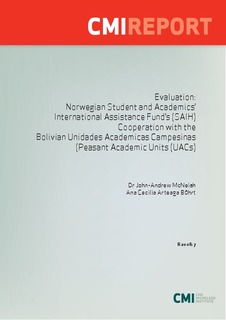Evaluation: Norwegian Student and Academics' International Assistance Fund's (SAIH) Cooperation with the Bolivian Unidades Academicas Campesinas (Peasant Academic Units UACs)
Abstract
Responding to the Terms of Reference determined by SAIH for this study the main questions asked in this evaluation are: 1. To what degree has the cooperation with SAIH strengthened the UACs as higher educations institutions with particular focus on indigenous peoples? How do the UACs relate to SAIH Strategy for Education for Development 2008-2012? What role do the UACs play in the new political context of Bolivia?
On the basis of field research and a series of interviews carried out in May 2008, the evaluation concludes positively in response to the first two of these questions. The evaluation concludes that the cooperation with SAIH has strengthened the UACs as higher education institutions with particular focus on indigenous peoples. It concludes that the UACs are evidently working in line with SAIH’s strategy for “education for development”. The evaluation describes in detail the basis of these qualitative judgements. Whilst returning positive answers to these questions the evaluation does, however, underline that a range of improvements need to be made by the UACs in order to ensure their sustainability and to develop and expand their significance as “actors for change”. The evaluation concludes that as a result of poor foresight and cooperation, coupled with the confusing and divided political reality of Bolivian politics, the UACs do not currently play an important role in the new political context of Bolivia. Work needs to be done to better cooperate and profile the particular inter-cultural and bilingual education offered by the UACs in a range of appropriate areas for local development.
Publisher
Chr. Michelsen InstituteSeries
Research reportR 2008: 7
